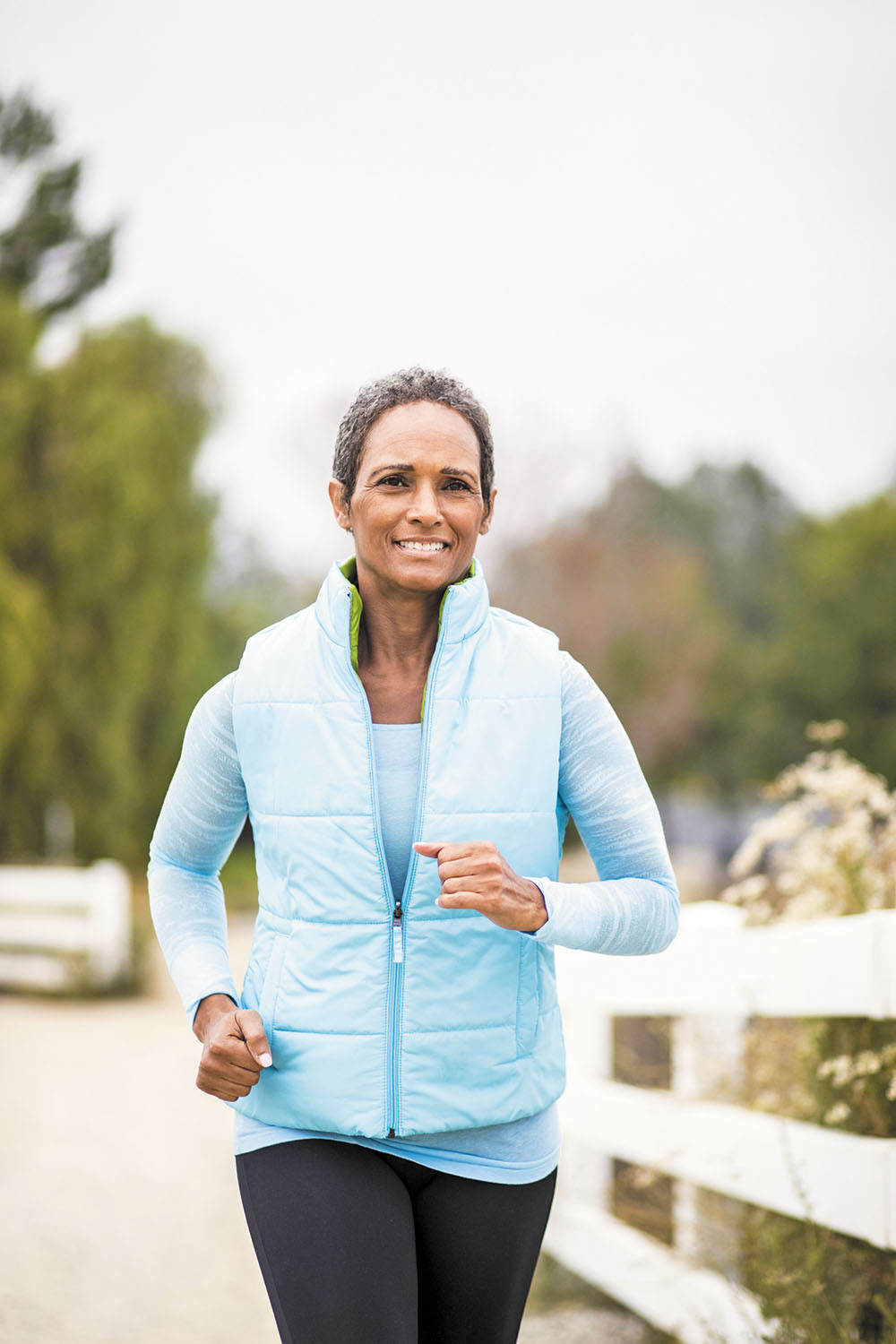
5 timeless habits for better health

What are the symptoms of prostate cancer?

Is your breakfast cereal healthy?

When pain signals an emergency: Symptoms you should never ignore

Does exercise give you energy?

Acupuncture for pain relief: How it works and what to expect

How to avoid jet lag: Tips for staying alert when you travel

Biofeedback therapy: How it works and how it can help relieve pain

Best vitamins and minerals for energy

Should you take probiotics with antibiotics?
Exercise & Fitness Archive
Articles
Easing into exercise
Even short stints of structured exercise may improve your heart health — and it's never too late to start.
Are you one of those people whose typical day includes doing chores around the house and yard, running errands, and caring for a spouse, grandkids, or pets? Having a busy, active life is one reason people think they don't need to set aside time devoted solely to exercise, says Gisele Bousquet, program director at Harvard-affiliated Brigham and Women's Cardiac Rehabilitation Program in Foxborough, Mass.
"People say, I'm very active, I'm always on the go," she says. Being physically active is good, she tells them. But doing regular moderate exercise — ideally for at least 30 minutes most days of the week — can lower your blood pressure and many other risk factors linked to heart disease. Even if you've never done formal exercise, starting in the second half of life can still make a difference (see "Exercise: Even starting after 60 can help").
Born to move: Human hearts evolved to need exercise
An international study of apes and of people from different walks of life reveals how the human heart responds to physical activity.
A unique study that compared the hearts of African great apes, native Central Americans, and American athletes sheds new light on the evolution and adaptability of the human heart. But the findings also have a practical message.
"They reinforce the importance of regular brisk walking or jogging throughout life to stay healthy as you age," says the study's senior author Dr. Aaron L. Baggish, director of the cardiac performance lab at Harvard-affiliated Massachusetts General Hospital.
Can music make workouts more fun and effective?
Research we're watching
Listening to up-tempo music during interval training may not only make your workout more enjoyable, but also elevate your performance, new research suggests.
Interval training involves short, repeated sessions of intense exercise separated by periods of less vigorous movement. It's an efficient but somewhat challenging strategy to improve fitness. However, music may make these workouts a bit easier, according to a small study in the November 2019 Psychology of Sport and Exercise.
The act of balancing
Maintaining proper balance as you age requires attention, strength, and flexibility.
One skill that can sharply decline with age, and often with little warning, is your sense of balance.
"As people age, changes in flexibility, muscle strength and power, body sensation, reflexes, and even mental function all contribute to declining balance," says Dr. Brad Manor, associate director of the Mobility and Falls Translational Research Center with Harvard-affiliated Hebrew SeniorLife. "You need to work on all these factors to maintain a strong sense of balance."
Can I do anything to prevent osteoporosis?
Ask the doctors
Q. I know that osteoporosis is linked to hereditary factors that I can't change. But are there things I can do to reduce my risk?
A. It's true that many risk factors for osteoporosis, such as your sex, age, and genes, are not things you can change. But there are things you can do to improve your bone health. This includes adopting a healthy diet that is rich in calcium and getting enough vitamin D, which can help maintain and improve bone health. Regular exercise can also help strengthen your bones or prevent bone loss. In particular, activities that put stress on your bones, such as jumping, running, and weight-bearing exercises, can stimulate bone cells to produce proteins that bolster bone strength. In children, these activities can actually increase bone density. While adults don't gain the same degree of benefit that kids do, exercise can still have moderate effects on bone, helping to maintain strength that might otherwise be lost. To further protect bone health, cut down on unhealthy habits, such as smoking or drinking excess amounts of alcohol. If you have risk factors for osteoporosis, you might also want to talk to your doctor about whether any of your medications might be harming your bone health.
Is your workout giving you a stiff neck?
Try these quick fixes to stay active and avoid neck pain.
Physical activity is important to feeling great and staying healthy. But the wrong execution of a particular move, such as a golf swing or swimming stroke, may wind up causing neck pain. "Often people don't realize their activity is to blame," says Emily Roy, a physical therapist with the Sports Medicine Center at Harvard-affiliated Massachusetts General Hospital.
Neck pain after working out: What goes wrong
Neck pain may result from overuse of muscles in the neck and shoulder (many shoulder muscles also attach to the neck), strain on the joints in the neck, or a pinched nerve in the neck or shoulder area.
The physical benefits of yoga
Yoga promotes physical health in multiple different ways. Some of them derive from better stress management. Others come more directly from the physical movements and postures in yoga, which help promote flexibility and reduce joint pain.
Following are some of the physical benefits of yoga that have a growing body of research behind them. In addition to the conditions listed below, preliminary research also shows that yoga may help with migraines, osteoporosis, balance and mobility issues, multiple sclerosis, inflammatory bowel disease, fibromyalgia, and ADHD.
Season of receiving: Use free services to stay independent
Nonprofit groups offer services that can help you age in place.
Image: © fstop123/Getty Images
The holidays are a time of giving, but they're also a time to put yourself on the receiving list and assess whether you should be taking advantage of free health-related services offered by nonprofit organizations. Services are widely available, often regardless of income. But you might not know they exist. "Most older adults aren't introduced to support services until they're hospitalized or they work with a case manager or social worker," explains Barbara Moscowitz, a geriatric social worker at Harvard-affiliated Massachusetts General Hospital. "You don't have to wait for such an event."
What's available
On the local level, you can often find free or low-cost dental clinics, emotional support groups, meal or grocery delivery services, transportation, in-home health evaluations, exercise classes, health education classes, home evaluations for fall prevention, companion programs, caregiver respite services, or programs to help you navigate difficult chronic health conditions and their treatment.
Gifts from the heart, for the heart
Here's a host of ideas that support healthy eating and exercise habits.
This holiday season, how about giving the gift of good health? From kitchen tools to a session with a personal trainer, there are many thoughtful presents that can have a lasting impact on a person's cardiovascular health. Here are suggestions from several Harvard experts.
Kitchen tools and gadgets
"Many of my patients want to eat healthier, and one good strategy is to prepare more meals at home. Because this takes time, kitchen tools and gadgets really can be helpful," says registered dietitian Kathy McManus, director of the Department of Nutrition at Harvard-affiliated Brigham and Women's Hospital. One great time-saving tool is an Instant Pot, which works as a pressure cooker, slow cooker, yogurt maker, rice cooker, and steamer, she says.
Competition may motivate people to walk more
Research we're watching
Counting steps with a fitness tracker doesn't always inspire people to be more active. But a little friendly competition may help, a new study suggests.
The study, published online Sept. 9 by JAMA Internal Medicine, included about 600 overweight or obese adults, all of whom received wearable step trackers and set goals to increase their daily steps. Researchers randomly divided them into four groups. The control group had only their goals and the step trackers; the three other groups also had different elements of games (support, collaboration, or competition) tied to their goals, an approach known as "gamification."

5 timeless habits for better health

What are the symptoms of prostate cancer?

Is your breakfast cereal healthy?

When pain signals an emergency: Symptoms you should never ignore

Does exercise give you energy?

Acupuncture for pain relief: How it works and what to expect

How to avoid jet lag: Tips for staying alert when you travel

Biofeedback therapy: How it works and how it can help relieve pain

Best vitamins and minerals for energy

Should you take probiotics with antibiotics?
Free Healthbeat Signup
Get the latest in health news delivered to your inbox!
Sign Up











